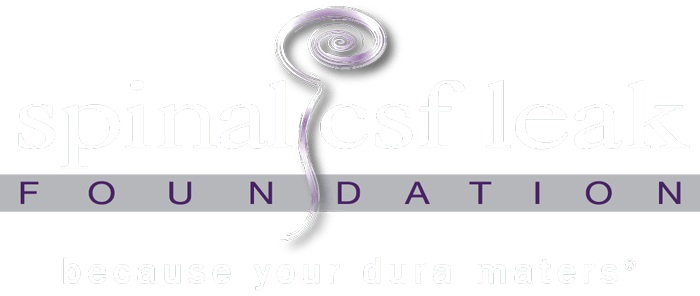
Jodi Blaszyk, PsyD, spinal CSF leak patient and clinical psychologist, discusses the final letter in her acronym ADAPT, for support in living with spinal CSF leak. To read the introduction to this series, click here.
The final letter in the ADAPT acronym is T, for Thrive
When trying to manage life with a spinal CSF leak, it’s easy to overlook one’s mental health. Our focus is naturally drawn to pressing matters such as finding the leak, managing pain, planning for treatment, or the carefully scripted limitations of recovery. Granted, these topics are high-stakes aspects of life with a leak. But unwittingly they can drain both physical and emotional resources. And after a while, in my case, I felt like there was nothing left for me. I certainly wasn’t thriving, even when I was inching my way toward improved physical health.
Finding small moments
Looking back now, I can see that my idea of “thriving” is different today than it was then. I used to think thriving was about getting the most things done in a day, or being successful in some measured way. Now I view smaller gains or little moments as thriving. Little moments can feed us, in a sense, and impart peace and wellbeing. For example, shortly after my leak onset, I suffered from extreme sensitivity to light. One of my little moments to thrive was when I realized that I could actually tolerate a few minutes of bright morning sunlight in my kitchen before my symptoms stirred.
Little moments can feed us, in a sense, and impart peace and wellbeing.
Sometimes too, little moments link to others, and these tiny realizations can lift one’s mood. I remember when I was at my most ill, I once found myself able to read for a short period one day when my symptoms were not as severe. For the span of 10 minutes or so, I lost myself in a story. The escape was a welcomed moment of thriving. It was also a signpost along the way that led to hope that I might read more later, and that my love of books was not lost. And, even when I could not read due to vision problems or feeling ill, it still felt comforting to leaf through books and glance at them on my bookcase. That earlier small “thrive” moment sustained me.
Taking control, and self-care
Thriving can include taking control of one’s environment, too. For example, being able to say no to things that will overstretch your physical or mental abilities, stir symptoms, or compromise your sense of wellbeing. It might be as simple as politely turning away an offer to visit, saying no to a phone call, or leaving a family gathering to lay quietly in bed. Thriving can be by design, whatever creates the greatest chance for comfort, healing, contentment, and peace.
Many options exist for self-care. Perhaps the best kind of self-care supports both physical comfort and safety as well as emotional wellbeing. For some people, it may be as simple as limiting symptom triggers, allowing others to help, or saying no to activities that will compromise recovery or overextend physical and mental limits. For me, it was allowing neighbors and friends to help manage aspects of my day-to-day basics when I was post-treatment. It was very difficult to accept this help at first. However, once I did, I felt psychologically freed up, and filled with gratitude.
An eye toward the future
Another form of self-care is to pursue interests in the scope of what you can do today, with an eye toward the future. It can be helpful to select activities that support a longer-range goal or interest. In this way, hobbies and interests can take further shape or find new beginnings. How I would love to turn back time and invest the many hours I spent in worry and rumination toward a goal I have presently! And of course, engagement with others, even if online, can work to keep a low mood and even depression at bay.
Overall, adaptation to a spinal CSF leak requires not only practical environmental changes, diligence, and patience, but perhaps just as important, purposeful modifications of thinking and behavior. Many of these modifications are likely within grasp of spinal CSF leak patients and may serve to ease the journey, no matter how long, and protect mental health—allowing us to thrive no matter where we’re planted.
In conclusion
I started off this series of articles by talking about my own personal journey towards learning to adapt, and of course this journey continues. Just recently, I was able to find an important way to thrive in the midst of uncertainty, through a modification that has been both a small blessing and big relief. In my introduction, I wrote about being afraid to cry because I worried it would make my symptoms worse. Crying, after all, had been part of what started my leak symptoms in the first place. But I finally realized that I can cry: I discovered that as long as I pay attention to my breathing, I’m able to experience this important release.
Although this may seem a small thing, it exemplifies lessons I learned on the leak journey—including the importance of taking a slow approach toward a seemingly small goal. For me, this was a goal (letting myself cry) that if spoken or written earlier might have seemed odd or frivolous. Yet my inability to cry kept me bound to fearful memories that were tied to my leak’s onset. Surely, this was a burden on my emotional health. I marvel that such a small modification of breath could lead to the recovery of an integral part of being human, allowing me to find something that was lost in the quake of illness: The ability to freely express grief.
It is my hope that no matter how long I am on this journey, I can continue to find ways to thrive within my lived experience. And I hope that sharing these skills about learning to ADAPT while living with spinal CSF leak can help you do the same.
This content is provided for general informational and educational purposes only and is not intended or implied to be a substitute for professional medical advice, help, diagnosis, or treatment. If you think you have an emergency, please call your doctor or emergency services immediately. To find a mental health provider, you can visit the ADAA Find a Therapist directory. If you are in a mental health crisis, call the National Suicide Prevention Lifeline at 988 or reach out to the Crisis Text Line by texting HOME to 741741 to connect with a crisis counselor.
